Kärcher Study 2019: Cleaning helps combat daily stress
We asked over 11,000 people worldwide about their cleaning habits and discovered astonishing information. In our cleaning study we describe how cleaning helps combat daily stress and reveal which country spends the longest time cleaning.
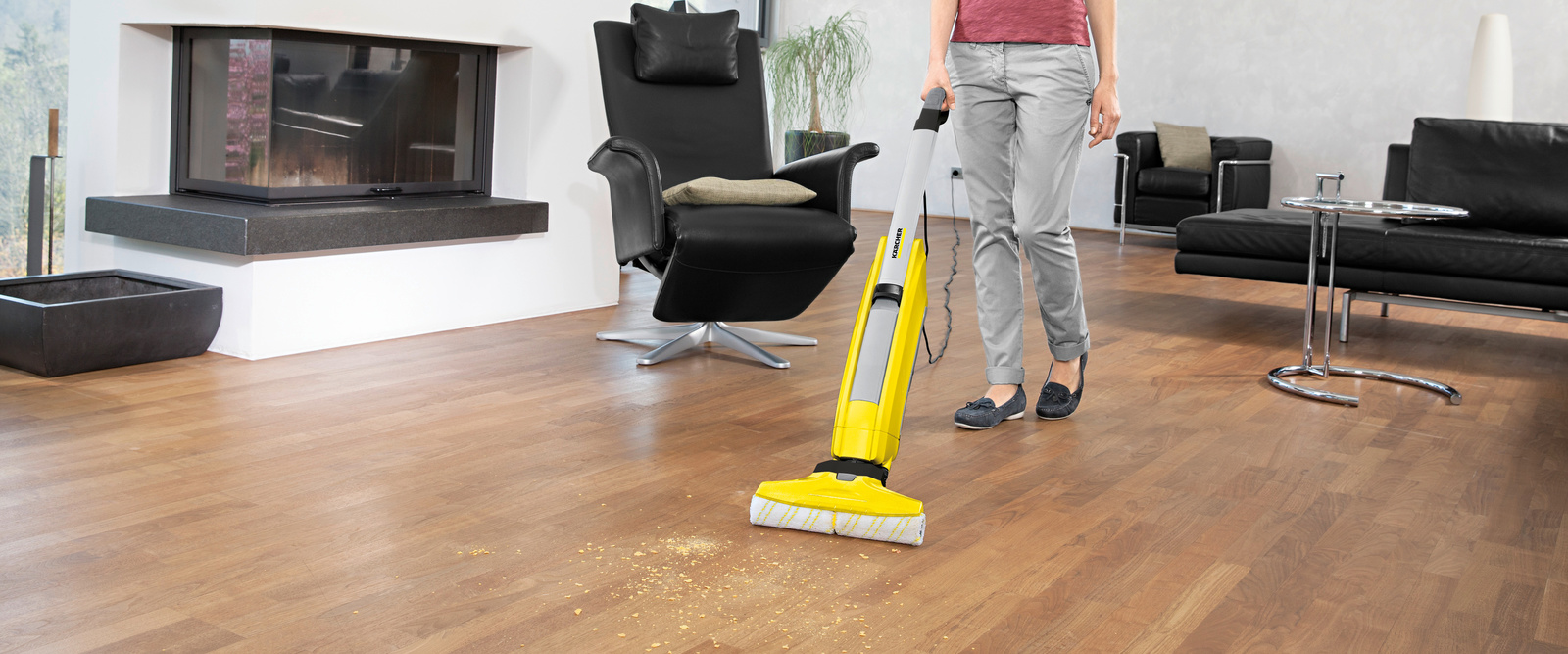
Anyone who grabs cloths and a vacuum cleaner does so with anticipation of the result: a clean home where you can relax and feel happy. But the journey is often the reward: for many people the cleaning process has a stress-reducing effect. For example, 75 percent of Brits state they always mop when they are stressed. With the result that 84 percent feel calmer and more relaxed in a clean home. Also in France there is a connection between cleaning the house and stress relief: 59 percent of the French even describe themselves as meditative and calm during the cleaning process. The international cleaning study, which was conducted by Dynata on behalf of Kärcher in eleven countries, reveals this and many other findings.
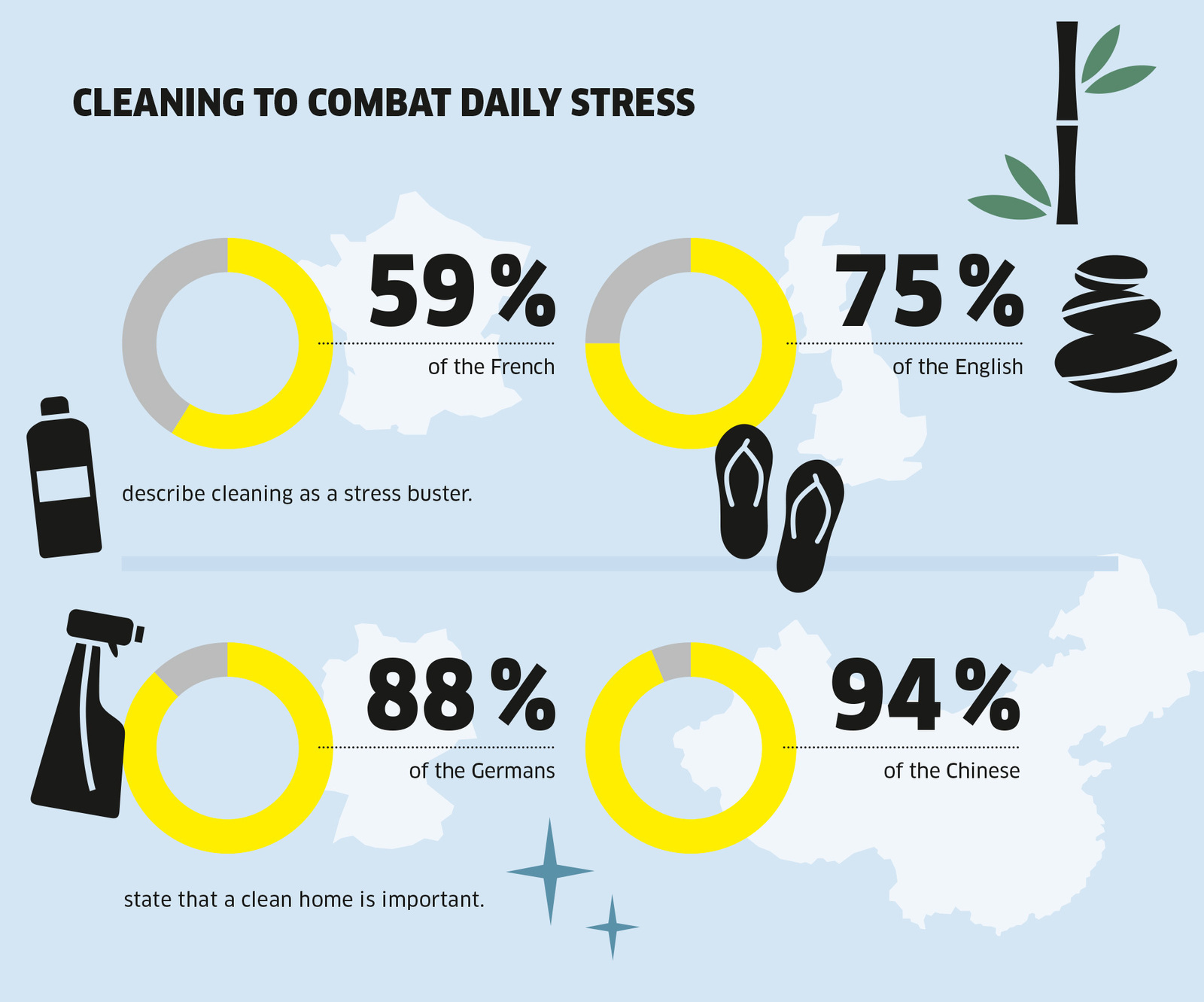
Cleaning, but thoroughly
Two thirds of Germans clean at least once a week - 13 percent even do so on a daily basis. The study shows: Saturday is not the alleged "cleaning day", actually only 9 percent of Germans have a set day for cleaning. This doesn't change the result: 88 percent of the local respondents attach huge importance to a clean home.
Cleaning is also celebrated in China. Here deep cleaning, for example with a steam cleaner, is very important – 94 percent of the respondents consider this intensive approach important or very important. In the 25-34 year old category almost all respondents share this sentiment (99 percent). Which living area should be cleaned thoroughly? The kitchen with 41 percent, the bathroom and bedroom, each with 25 percent.
How long the world spends cleaning
All over the world house cleaning takes as long as an average cinema visit, an extensive walk or a coffee date with friends.
Worldwide people spend on average two hours and fifty two minutes cleaning per week. At 4 hours 49 minutes the Russians spend the most time cleaning their own four walls. This hardly comes as a surprise. Cleanliness is important for 97 percent of Russians. People also spend a lot of time cleaning in Belgium: at 3 hours 39 minutes the respondents are among the leaders - and yet 45 percent of them wish they had more time for the household. On an international comparison, the Japanese attach the least amount of importance to a clean home - which is also reflected in the cleaning duration: it is 1 hour 29 minutes in the land of smiles.
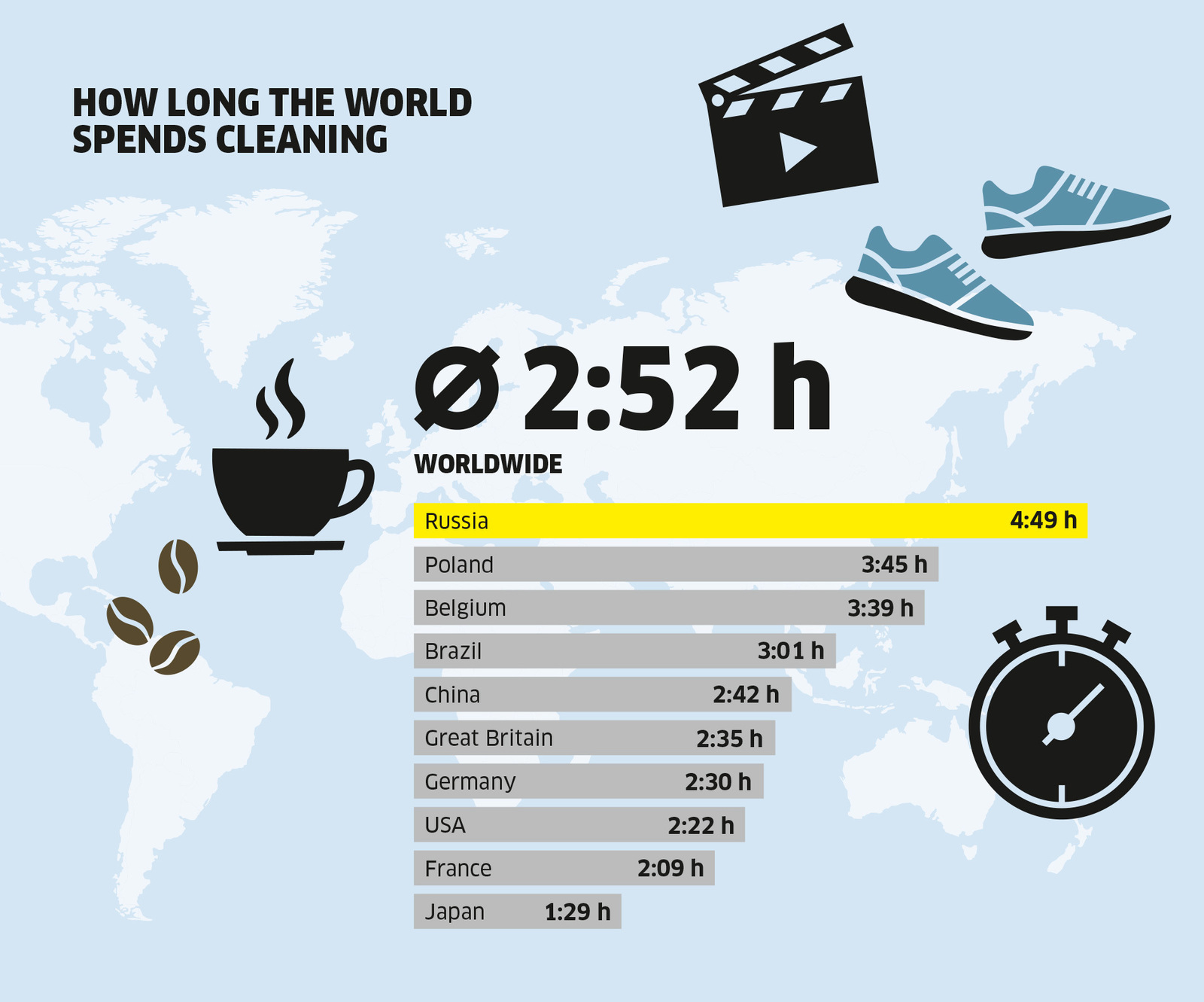
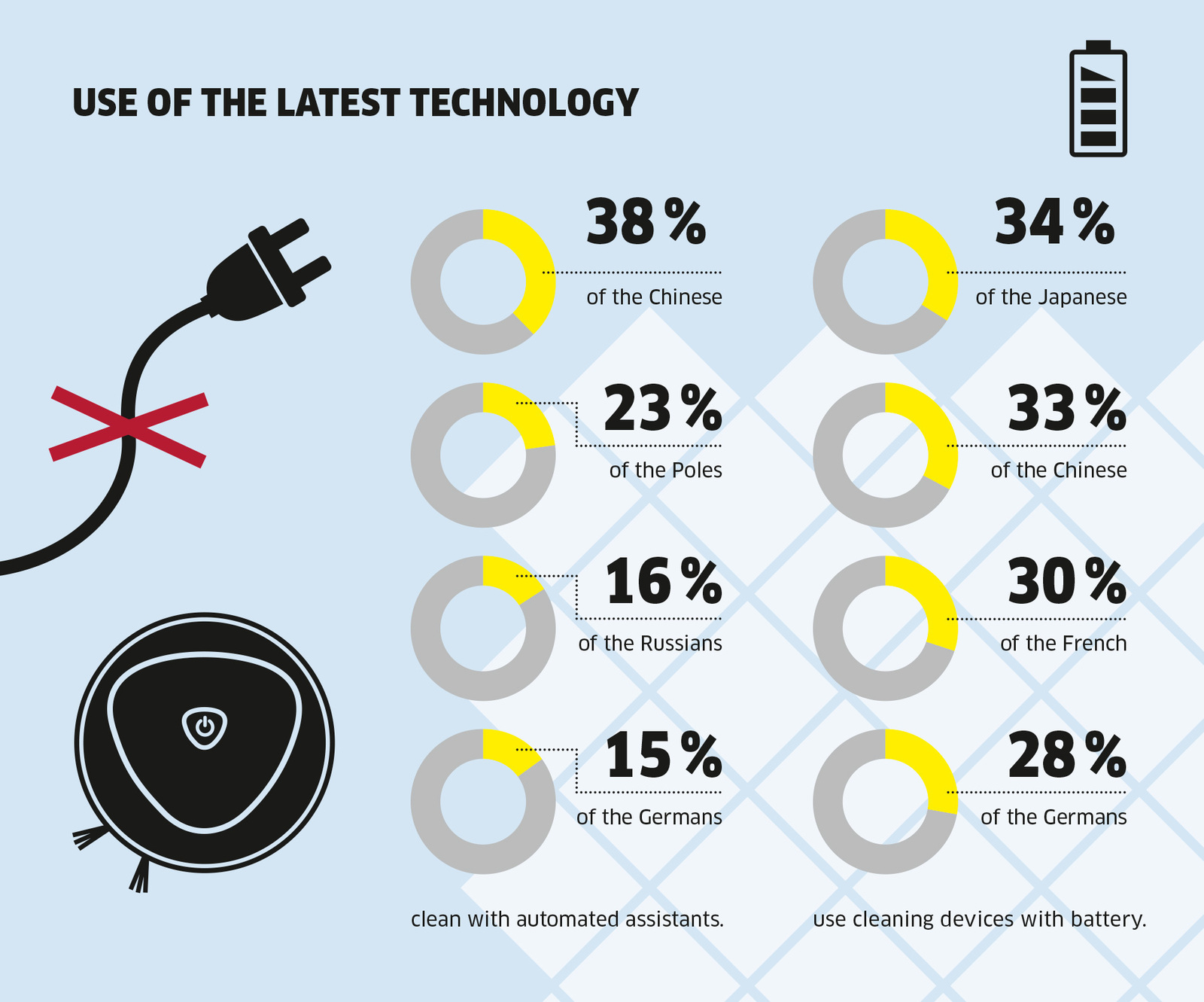
Classic helpers versus state-of-the-art technology
The appropriate helpers ensure cleaning is simple and effective. Worldwide people cannot do without manual tools such as brooms, brushes, mops, etc. (79 percent), chemical detergents (75 percent) or electrical cleaning equipment with cable (66 percent) – these are used most by all respondents. However, the trend is clearly heading towards cordless devices. In Japan, electrical helpers with battery are very popular - every second Japanese person (54 percent) considers their use important, one third (34 percent) already rely on them. The opinions on autonomous cleaning solutions such as robotic vacuum cleaners vary greatly from country to country – their services are used most frequently in China by far at 38 percent. In Germany, the use remains static compared to the previous year at only 15 percent.
In contrast, other countries rely on the support of fellow human beings, above all in Poland: every second person (52 percent) here relies on help from a partner, family members or housemates.
Interview on cleaning behaviour with the psychologist Dr. Brigitte Bösenkopf
For several years, the international Kärcher cleaning survey has been providing information on the topics of people's cleanliness, orderliness and cleaning behaviour. In this year's survey, which was commissioned by Kärcher and carried out by Dynata in eleven countries, the following result in particular stands out: Cleaning leads to relaxation, and even meditative states. This is said by at least 75 per cent of the English and 59 per cent of the French. Cleaning as a compensatory feel-good activity? Kärcher wants to know more, and asked Dr. Brigitte Bösenkopf, psychologist, journalist and head of the Stress Centre in Vienna.
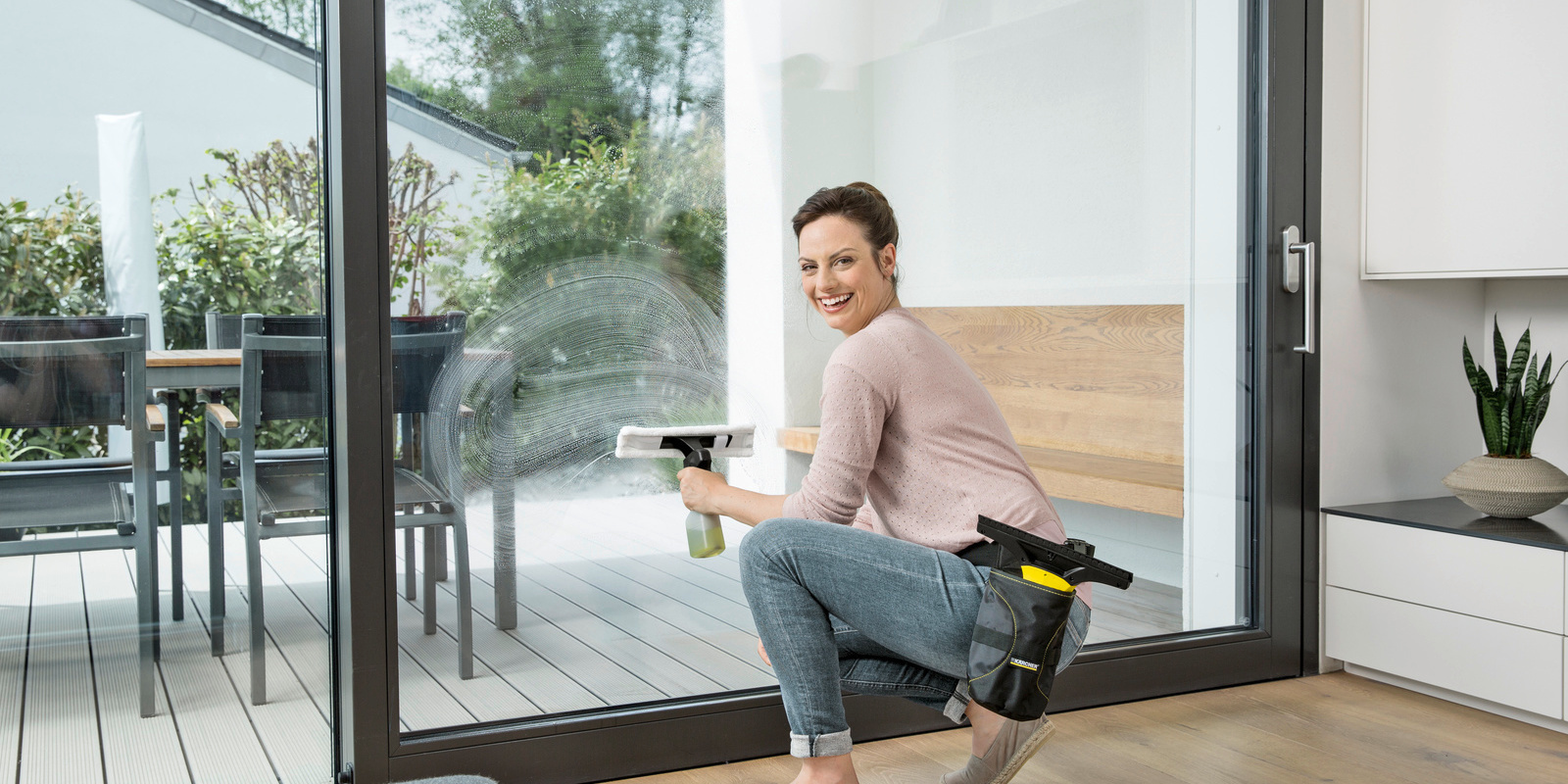

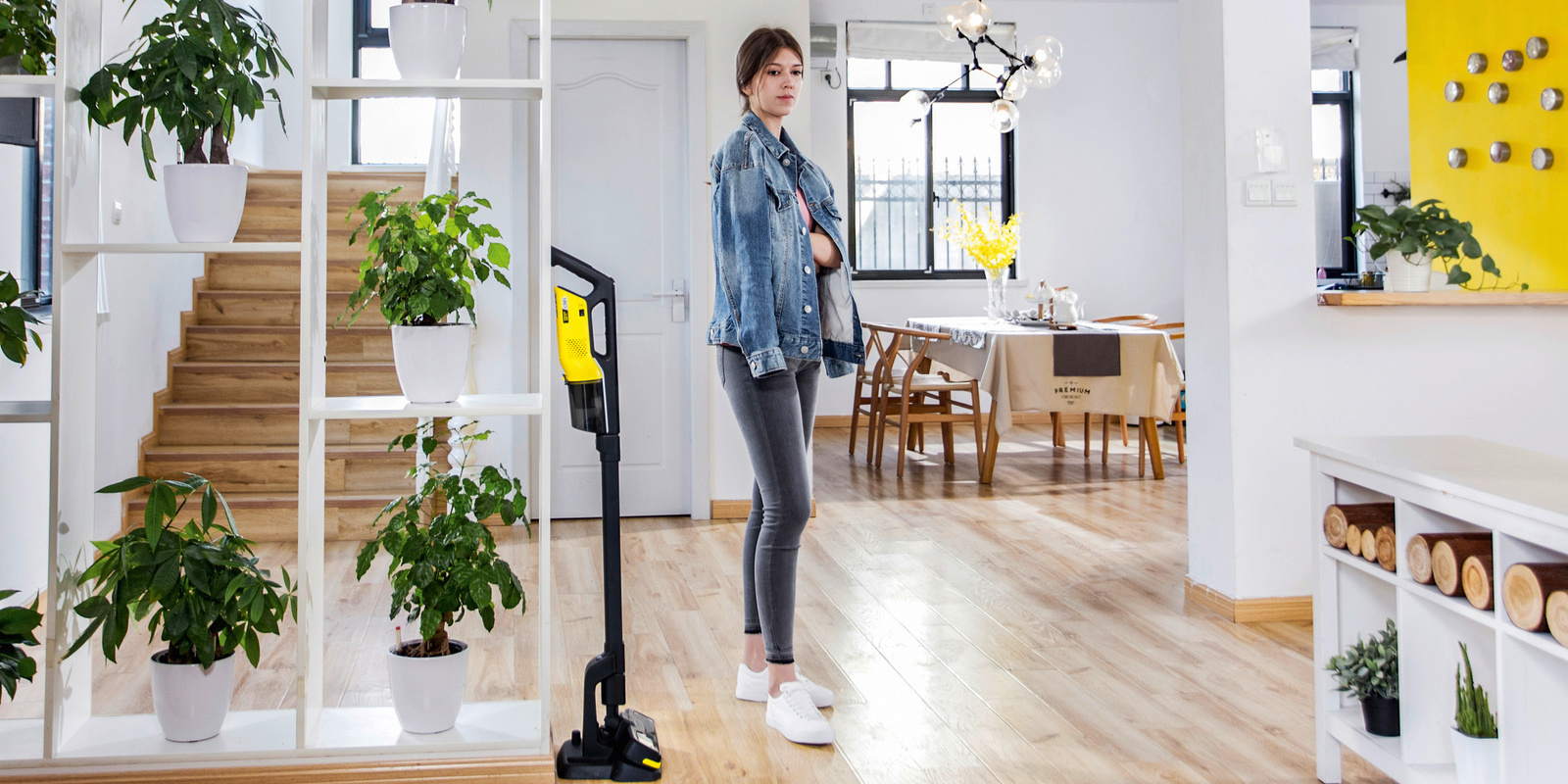

Interview
Dr. Bösenkopf, we are living in fast-moving times. Phases of relaxation need to be deliberately planned. Why is it precisely cleaning that seems to offer this to many people?
In hectic daily life, people seek opportunities to relax. They suffer under the increasing demands in both their professional and private lives, the pressure of time, and the desire to fulfil themselves even under the difficult circumstances. This is where cleaning comes in. Neurobiologists have discovered that our brain releases endogenous reward substances when it is able to function routinely. Cleaning offers precisely that. It is concentrated on the moment, our mind becomes clear, and in addition our efforts are rewarded with a clean home. While cleaning, we are our own masters and can divide the work as we wish – the neuronal effort is minimal and our brain is relaxed. Cleaning, vacuuming etc. thus become a personal relaxation ritual for many people.
But cleaning does not automatically mean relaxation for everyone, even though almost all the participants in the study (92 per cent) attach importance to a clean home. From a psychological point of view, how can people motivate themselves for cleaning?
Our inner attitude to cleaning decides whether we perceive the activity as a necessary evil or as an opportunity for relaxation. It helps reluctant cleaners to see cleaning as a positive challenge that must be dealt with calmly. With a little practice, they too can find fulfilment in the household and appreciate cleanliness as a well-earned reward. Whoever is able to become fully absorbed in the activity can blank out problems and devote their full attention to the current action. Many people describe this state as a meditative cleaning experience, which can counteract stress and signs of fatigue.
In principle, the motivation for cleaning can vary greatly. For some it is the relaxing effect, for others cleanliness is itself the great incentive. The activity also gives many people a sense of certainty – they have the feeling that, with their external world, their "inner world" is also under control.
When the intention to clean meets hectic daily life, the dirty floor quickly becomes a symbol of admonishment and an additional stress factor. What can we do if our motivation is high but our time is limited?
Investigations show that stress is often not caused by external pressure, but is 70 per cent home-made. This is decided by our personality. Resilient people who accept stress not as pressure, but as a daily challenge, can solve the dilemma easily. They concentrate on what's feasible, and do not waste energy on self-criticism if their professional commitments leave little time for their housework.
People who are stressed out by the chaos at home should not feel sorry for themselves, but proceed strategically and consider very carefully which cleaning activities can be managed in how much time. With this attitude, cleaning becomes a positive experience.
"Modern cleaning aids support the human desire for order and cleanliness"
In former times, it was usual to carry out domestic chores on a specific week day. The results of the study indicate a much less rigid framework. Why might this be?
In many families, but also in single households, the weekend is taken up with leisure activities. The classic Saturday cleaning no longer fits the schedule. Cleaning activities are preferably carried out during the week in smaller portions. After a busy day, many people even see their evening cleaning ritual in a positive light. For example, they can forget their professional worries and devote themselves to an activity in which they can immediately see positive results, while at the same time being able to switch off.
The average time spent cleaning varies greatly from country to country. An international comparison shows practically anything from one and a half to almost five hours. How can this be explained?
Here, two factors play an important part: the individual personality and the cultural environment, in other words to what extent cleanliness and orderliness are established as values in a society. Perfectionists, for example, invest a lot of time in a tidy home, whereas chaotic people can easily come to terms with untidiness. Workaholics, on the other hand, would rather invest all their energy in their work than in cleaning, and relationship-minded people love to create a comfortable, clean home. In addition to such peculiarities and individual attitudes to the topic of cleaning, the values prescribed by society are hugely influential.
Where is cleaning heading? Will technical developments enable people to increasingly experience cleaning as relaxing?
Modern cleaning aids support the human desire for order and cleanliness. And precisely in our hectic everyday lives, the technical aids are proving to be a true blessing for many. They save time and generally deliver better results than traditional cleaning procedures. So working people with limited spare time can also enjoy the stress-relieving effect of cleanliness and order. And we mustn't forget that the use of innovative technological devices is also simply fun. As in many areas of life, technology is playing an increasingly important part in cleaning.


